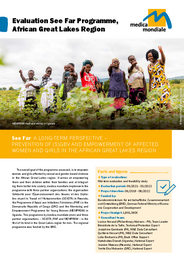Evaluation – Great Lakes Region, Africa: Tackling sexualised violence across borders

Armed conflict, poverty, flight and expulsion as well as unequal power relations are all factors leading to an increase in sexualised violence in the Great Lakes Region of Africa . It is the region on the continent of Africa with the highest incidence of sexualised violence against women and girls – in DR Congo, in Uganda and in Rwanda.
Young people face particular risks: in Uganda girls are often married off as minors, in DR Congo sexualised violence is tolerated at schools, and in Rwanda children born out of rapes committed during the genocide face social exclusion. The Covid-19 pandemic and restrictive lockdown measures have made existing inequalities in gender dynamics more severe. Violence and repression of women have increased.
DR Congo, Rwanda & Uganda: Preventing violence and supporting women in the long-term
In order to counteract these spirals of violence, disadvantage and lack of opportunity, in 2019 medica mondiale initiated the joint project “See Far” – the first of its kind in the Great Lakes Region. In the long term the aims are to prevent gender-based violence and to empower affected women and girls. The organisations SEVOTA (Rwanda), PAIF (DR Congo) and MEMPROW (Uganda) are working together on ways to break apart patriarchal structures across borders and make the whole region a safer place for women and girls.
Evaluation: “See Far” program of regional and national significance
According to the project evaluation, from 2021 to 2022 the “See Far” program was very important at both regional and national levels. It is targeted at the particularly vulnerable populations such as women and girls. The well-being and life conditions of survivors of sexualised violence have changed positively during the duration of the program. In particular, the psychosocial counselling and income generating measures had a very high beneficial value. These were intended to emotionally strengthen the women and girls so they are capable of joining forces to cope with everyday challenges and feed their children.
SEVOTA, PAIF and MEMPROW are seen as established women’s rights organisations. Regional and international actors have now expressed their interest in co-operating as part of this program. Initial efforts to bundle the partners’ political work at a regional level are also included in the program and will be expanded as the next “See Far” program progresses. In addition, the partner organisations were also able to apply their expertise in the stress- and trauma-sensitive approach, which the team at media mondiale had developed for exactly this type of project.
Recommendation: Improve use of the potential of women’s rights organisations
The evaluation identified a need to improve the cooperation between the partner organisations. The aim is to help them fulfil their full potential and work more effectively towards the goals of the feminist program. This would require a clearer command structure for co-operation within the program, as well as further human and material resources.
The evaluation team recommends placing the focus more strongly on the prevention of violence. For this, the partner organisations could develop strategies that are fully rooted in social transformation and in feminist perspectives. Additionally, there should be continued enhancement of the organisational development and the independence of the partner organisations.



